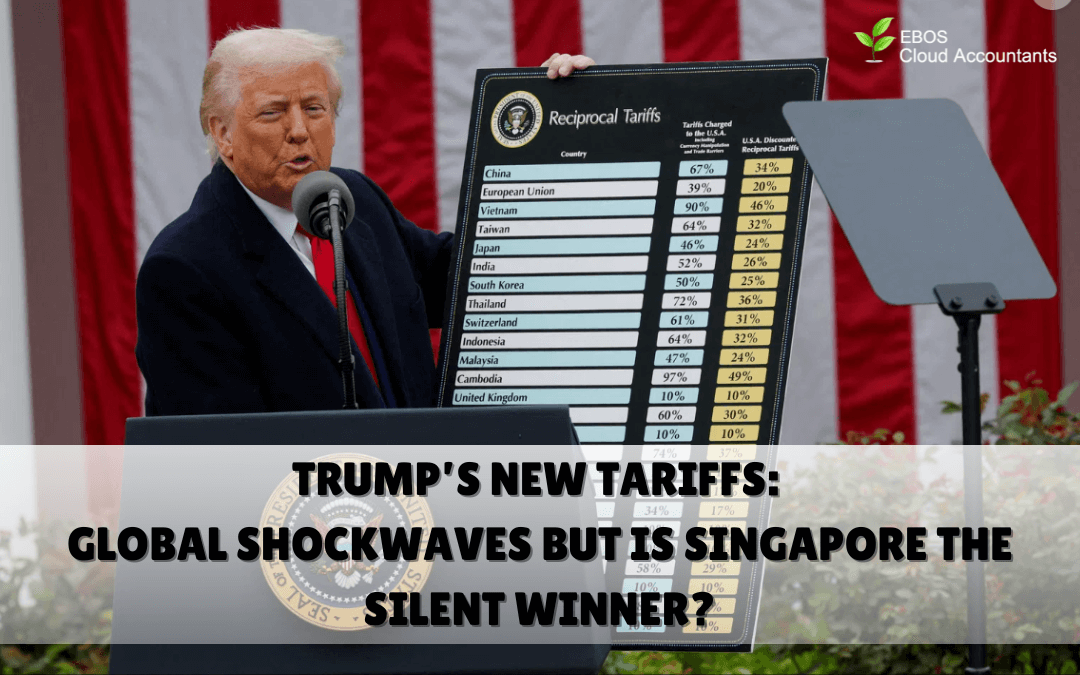With Donald Trump once again making headlines over proposed sweeping tariffs—reportedly as high as 60% on Chinese imports if he returns to the White House in 2025—the world is bracing for what could be a fresh wave of economic disruption. The last round of Trump-era tariffs during his presidency sparked a global trade war that reshaped supply chains, triggered tit-for-tat retaliations, and cost businesses billions. As markets react with caution, many countries are beginning to assess the potential fallout.
But amidst the uncertainty, one nation seems unusually well-poised to gain: Singapore.
Global Trade Faces a Familiar Threat
Trump’s latest tariff proposals aim to punish what he calls “unfair trade practices,” particularly from China. His plan includes a universal baseline tariff on most imported goods and significantly higher rates on Chinese products. It’s a strategy designed to bring jobs and manufacturing back to American soil, but the ripple effects are global.
For major exporting economies—from Germany to South Korea—the impact could be substantial. A rise in tariffs often leads to a slowdown in international trade, increased costs for consumers and businesses, and weakened investor confidence. For emerging economies heavily reliant on trade with the U.S. or China, the uncertainty can be even more destabilizing.
However, when global supply chains are forced to adjust, there’s often opportunity hidden in the chaos—and this is where Singapore quietly steps in.
Singapore: A Strategic Outlier in the Tariff Storm
1. A Safe, Neutral Trade Hub
Unlike many of its regional peers, Singapore has maintained a consistent foreign policy of neutrality. It’s not entangled in geopolitical power plays, and it’s not seen as favoring the U.S. or China too heavily. This balanced diplomacy has made Singapore a preferred location for multinational corporations, especially those looking for a stable and predictable base in Asia.
In times of global tension, neutrality becomes an asset. Companies seeking to hedge against political risk may move regional headquarters or operational bases to Singapore, where they can avoid the uncertainties of being caught in the crossfire of a trade war.
2. Logistics, Connectivity, and World-Class Infrastructure
Singapore’s port is one of the busiest and most advanced in the world. Its Changi Airport remains a key aviation hub. And the nation continues to invest heavily in digital infrastructure, automation, and smart logistics systems. As businesses look to reconfigure supply chains away from China—a trend already underway since the 2018–2020 trade war—Singapore stands ready to take on a larger role as a transshipment hub, warehousing center, and logistics nerve center.
This re-routing of trade routes could see Singapore become a critical node in the new supply chain map of Asia.
3. Business-Friendly Environment and Global Talent Magnet
Singapore consistently ranks at the top of global indices for ease of doing business, innovation, and governance. It has a competitive tax regime, strong intellectual property protections, and a highly educated workforce.
For global firms considering a shift in their Asia strategy, Singapore is already a natural choice. If the trade environment worsens, this appeal only grows. Companies looking to reduce exposure to China while retaining access to Asian markets may increasingly turn to Singapore as a launchpad.
The government’s efforts to attract tech firms, fintech startups, and even high-net-worth individuals through targeted visa programs (like Tech.Pass and Global Investor Program) also help create an ecosystem that’s adaptable, resilient, and global in outlook.
Caveats: Singapore Is Not Immune
While the city-state may stand to gain from trade realignments, it’s not completely insulated from risk.
1. Exposure to Global Trade Fluctuations
Singapore’s economy is deeply tied to global trade flows. Nearly 300% of its GDP is linked to trade. Any major slowdown in global economic activity—whether due to tariffs, inflation, or geopolitical tensions—can have real effects on Singapore’s exports, investments, and financial markets.
2. Rising Competition from ASEAN Neighbors
Countries like Vietnam, Malaysia, and Indonesia are also vying to take over parts of China’s manufacturing role. While Singapore may lead in services, logistics, and headquarters functions, it faces regional competition when it comes to attracting manufacturing and supply chain investment.
3. Geopolitical Balancing Act
Although Singapore has managed to walk a tightrope between the U.S. and China, the pressure to “choose sides” may increase as global decoupling intensifies. Remaining neutral will become more difficult if either power begins to push allies and partners into firmer camps.
Conclusion: The Silent Winner No One Expected?
As Trump’s new tariff agenda unfolds, the world may again find itself in the throes of a prolonged trade confrontation. Supply chains will shift, markets will wobble, and some countries may face severe economic fallout.
But amid the noise, Singapore might just emerge as the silent winner.
Its neutrality, infrastructure, and status as a trusted global hub put it in a unique position to benefit from trade realignments. Companies seeking stability and connectivity in uncertain times may increasingly choose Singapore as their gateway to Asia. And in a world where volatility becomes the new normal, being the reliable, quiet player in the room can sometimes be the most powerful move of all.
Enjoyed this article? Curious to learn more about incorporation? Click here for more insights!
‘Image sourced from an online article’







